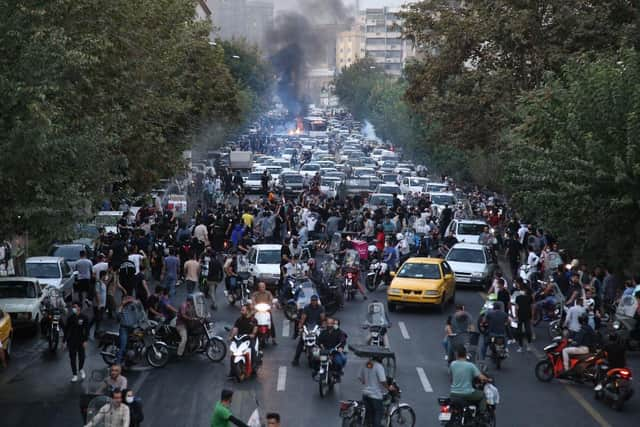United Nations Human Rights Commission's Social Forum cannot be chaired by Iranian diplomat Ali Bahreini as his regime kills hundreds of its own people – Struan Stevenson
This article contains affiliate links. We may earn a small commission on items purchased through this article, but that does not affect our editorial judgement.
Does the United Nations know no shame? As an organisation created to implement and uphold the highest ideals of peace, justice, and human rights, how is it possible that an ambassador from Iran’s theocratic fascist regime will be appointed as chair of the UN Human Rights Council’s Social Forum in November?
The appointment of Ambassador Ali Bahreini will make a mockery of the universal declaration of human rights and international conventions, given that Iran is the leading violator of these principles. The UNHRC Social Forum is expected to “focus on the contribution of science, technology, and innovation to the promotion of human rights, including in the context of post-pandemic recovery”.
Advertisement
Hide AdAdvertisement
Hide AdHow can an agent of the mullahs’ regime, which has executed at least 122 prisoners in the past three weeks in a killing spree designed to terrorise the population and quell political unrest, take on this role? Last weekend, the regime executed three young men arrested during the protests after torturing them into making false confessions. Dozens of prisoners on death row are currently being transferred to solitary cells to await execution.
Indeed, Sadegh Rahimi, a deputy in the regime’s judiciary department, has called for the speeding up of executions, stating that “the time interval between the occurrence of a crime and the issuance and execution of the sentence should be reduced”. How can Iran be invited to chair this UN body during this killing frenzy, when it has overseen the slaying of 750 innocent civilian protesters and the arrest of a further 30,000, during the current nationwide uprising? How can the UN contemplate this appointment when it has itself launched an international fact-finding commission to investigate the crimes of the regime during the uprising?
The UN’s special rapporteur on Iran, Javaid Rehman, told the UNHRC that he was alarmed by the scale and gravity of the reported cases of murder, imprisonment, enforced disappearance, torture, rape and persecution in the Islamic Republic. He was one of those who called for an international commission.
On December 15, the United Nations General Assembly denounced the brutal and systematic violations of human rights in Iran, yet it now seeks to reward the tyrannical regime with a key human rights appointment. It is shameful and exposes the degeneracy at the heart of the UN that enables pariah nations and human rights violators like Russia, China, Belarus, North Korea, Nicaragua, Venezuela, and Iran to hold the civilised world to ransom. Bahreini’s appointment will be interpreted by the regime as a green light for more torture and killing. The mullahs will reassure their brutal Islamic Revolutionary Guards Corps thugs that such international endorsement of their regime validifies their use of torture and execution as a means of repression.
The UN should perhaps take note of the mass of information that has recently been successfully hacked from the internal security files of the Iranian Ministry of Foreign Affairs (MFA). Members of a hacktivist group known as Ghiam ta Sarnegouni – roughly translated as ‘Uprising until Overthrow’ –which is affiliated with the main democratic opposition movement, the Mojahedin-e Khalq (MEK), released hundreds of identification documents, minutes of meetings, the ministry’s correspondence, phone numbers of ministry officials, and the names of 11,000 MFA employees. This treasure trove of top-secret documents included 210 websites, software applications, servers, data banks, and other elements of the foreign ministry. The stash of records reveals how the MFA and the Ministry of Internal Security have used their embassies as terror cells and deployed their ambassadors as terrorists.


One of the clearest examples of this activity was the arrest in Europe of the registered Iranian diplomat Assadollah Assadi in 2018. He was caught red-handed, passing a bomb, professionally prepared in Tehran and flown to Europe in his diplomatic pouch, to three co-conspirators and instructing them to detonate it at a major Iranian opposition rally in Paris. Assadi and his co-conspirators were sentenced to long jail terms in Belgium on terror charges. The leaked Iranian foreign ministry files show how the regime has gone into overdrive to secure Assadi’s release, claiming diplomatic immunity and when that failed, taking a Belgian charity worker hostage in Iran, accusing him of spying and sentencing him to 40 years imprisonment and 74 lashes. The documents show how Tehran used this tactic to try to negotiate a prisoner exchange with Belgium.
As the clerical regime enters its final phase, it is high time for the world to take concrete measures to hold it accountable for its egregious human rights violations. Iranians must be allowed to exercise their fundamental human rights without fear of reprisal. Justice and freedom are contagious, and the world must support the Iranian people in taking down their tyrants.
The clearest possible indication of this support would be for the UN Human Rights Council to rescind the nomination of Ali Bahreini for the role of chair of the Social Forum. The Social Forum’s president, Ambassador Václav Bálek, permanent representative of the Czech Republic to the United Nations Office at Geneva, must cancel Bahreini’s nomination and, by so doing, attempt to restore some semblance of integrity to his organisation.
Advertisement
Hide AdAdvertisement
Hide AdStruan Stevenson, a former member of the European Parliament representing Scotland, is coordinator of the Campaign for Iran Change and chair of the In Search of Justice committee on the protection of political freedoms in Iran. He is an international lecturer on the Middle East and president of the European Iraqi Freedom Association. His latest book is entitled Dictatorship and Revolution. Iran – A Contemporary History.
Comments
Want to join the conversation? Please or to comment on this article.